2230THS: Exploring Motives for University Students' Overseas Travel
VerifiedAdded on 2023/06/13
|10
|3079
|107
Report
AI Summary
This report presents a qualitative study examining the motives of university students for traveling overseas. It uses content analysis to explore the reasons behind these decisions, differentiating between male and female students. The study identifies themes such as travel aspirations, cultural learning, migrant personalities, and the desire for international experiences. It also highlights the importance of supportive environments, cost considerations, and personal growth as key factors influencing students' choices. The analysis reveals similarities in the desire for adventure and differences in motivations related to career prospects and personal fulfillment. This study aims to provide insights for enhancing pre-departure orientations and promoting effective cultural learning experiences for students studying abroad.
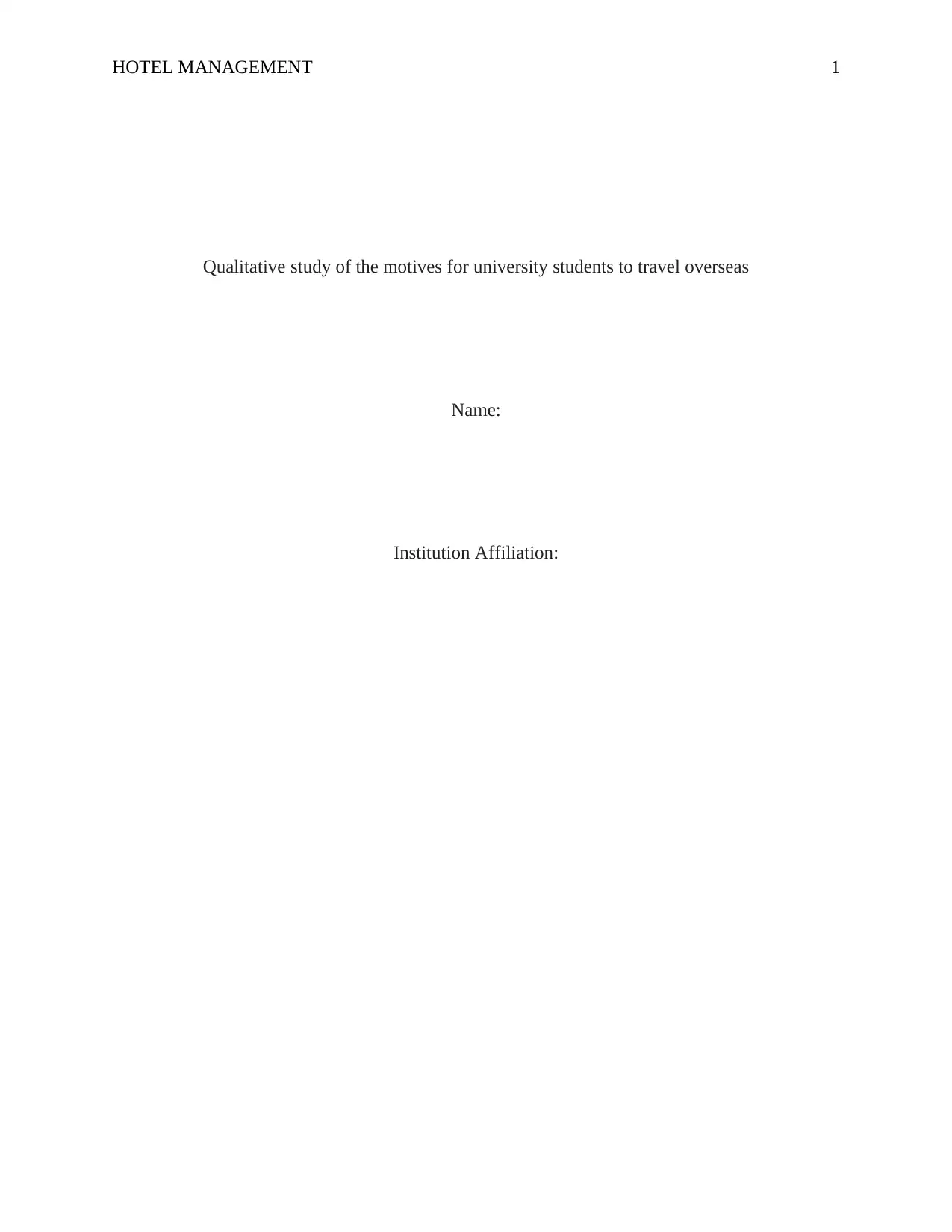
HOTEL MANAGEMENT 1
Qualitative study of the motives for university students to travel overseas
Name:
Institution Affiliation:
Qualitative study of the motives for university students to travel overseas
Name:
Institution Affiliation:
Paraphrase This Document
Need a fresh take? Get an instant paraphrase of this document with our AI Paraphraser
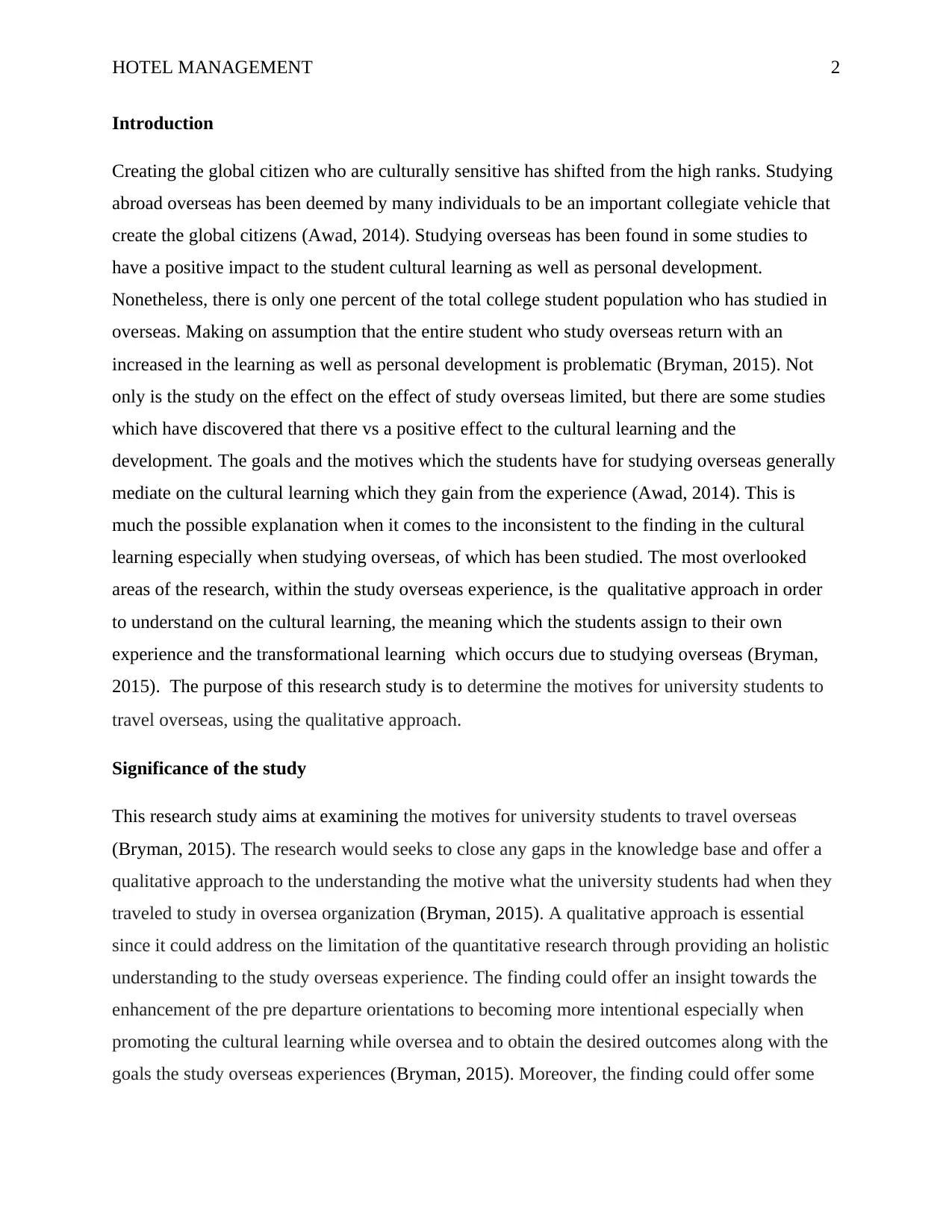
HOTEL MANAGEMENT 2
Introduction
Creating the global citizen who are culturally sensitive has shifted from the high ranks. Studying
abroad overseas has been deemed by many individuals to be an important collegiate vehicle that
create the global citizens (Awad, 2014). Studying overseas has been found in some studies to
have a positive impact to the student cultural learning as well as personal development.
Nonetheless, there is only one percent of the total college student population who has studied in
overseas. Making on assumption that the entire student who study overseas return with an
increased in the learning as well as personal development is problematic (Bryman, 2015). Not
only is the study on the effect on the effect of study overseas limited, but there are some studies
which have discovered that there vs a positive effect to the cultural learning and the
development. The goals and the motives which the students have for studying overseas generally
mediate on the cultural learning which they gain from the experience (Awad, 2014). This is
much the possible explanation when it comes to the inconsistent to the finding in the cultural
learning especially when studying overseas, of which has been studied. The most overlooked
areas of the research, within the study overseas experience, is the qualitative approach in order
to understand on the cultural learning, the meaning which the students assign to their own
experience and the transformational learning which occurs due to studying overseas (Bryman,
2015). The purpose of this research study is to determine the motives for university students to
travel overseas, using the qualitative approach.
Significance of the study
This research study aims at examining the motives for university students to travel overseas
(Bryman, 2015). The research would seeks to close any gaps in the knowledge base and offer a
qualitative approach to the understanding the motive what the university students had when they
traveled to study in oversea organization (Bryman, 2015). A qualitative approach is essential
since it could address on the limitation of the quantitative research through providing an holistic
understanding to the study overseas experience. The finding could offer an insight towards the
enhancement of the pre departure orientations to becoming more intentional especially when
promoting the cultural learning while oversea and to obtain the desired outcomes along with the
goals the study overseas experiences (Bryman, 2015). Moreover, the finding could offer some
Introduction
Creating the global citizen who are culturally sensitive has shifted from the high ranks. Studying
abroad overseas has been deemed by many individuals to be an important collegiate vehicle that
create the global citizens (Awad, 2014). Studying overseas has been found in some studies to
have a positive impact to the student cultural learning as well as personal development.
Nonetheless, there is only one percent of the total college student population who has studied in
overseas. Making on assumption that the entire student who study overseas return with an
increased in the learning as well as personal development is problematic (Bryman, 2015). Not
only is the study on the effect on the effect of study overseas limited, but there are some studies
which have discovered that there vs a positive effect to the cultural learning and the
development. The goals and the motives which the students have for studying overseas generally
mediate on the cultural learning which they gain from the experience (Awad, 2014). This is
much the possible explanation when it comes to the inconsistent to the finding in the cultural
learning especially when studying overseas, of which has been studied. The most overlooked
areas of the research, within the study overseas experience, is the qualitative approach in order
to understand on the cultural learning, the meaning which the students assign to their own
experience and the transformational learning which occurs due to studying overseas (Bryman,
2015). The purpose of this research study is to determine the motives for university students to
travel overseas, using the qualitative approach.
Significance of the study
This research study aims at examining the motives for university students to travel overseas
(Bryman, 2015). The research would seeks to close any gaps in the knowledge base and offer a
qualitative approach to the understanding the motive what the university students had when they
traveled to study in oversea organization (Bryman, 2015). A qualitative approach is essential
since it could address on the limitation of the quantitative research through providing an holistic
understanding to the study overseas experience. The finding could offer an insight towards the
enhancement of the pre departure orientations to becoming more intentional especially when
promoting the cultural learning while oversea and to obtain the desired outcomes along with the
goals the study overseas experiences (Bryman, 2015). Moreover, the finding could offer some
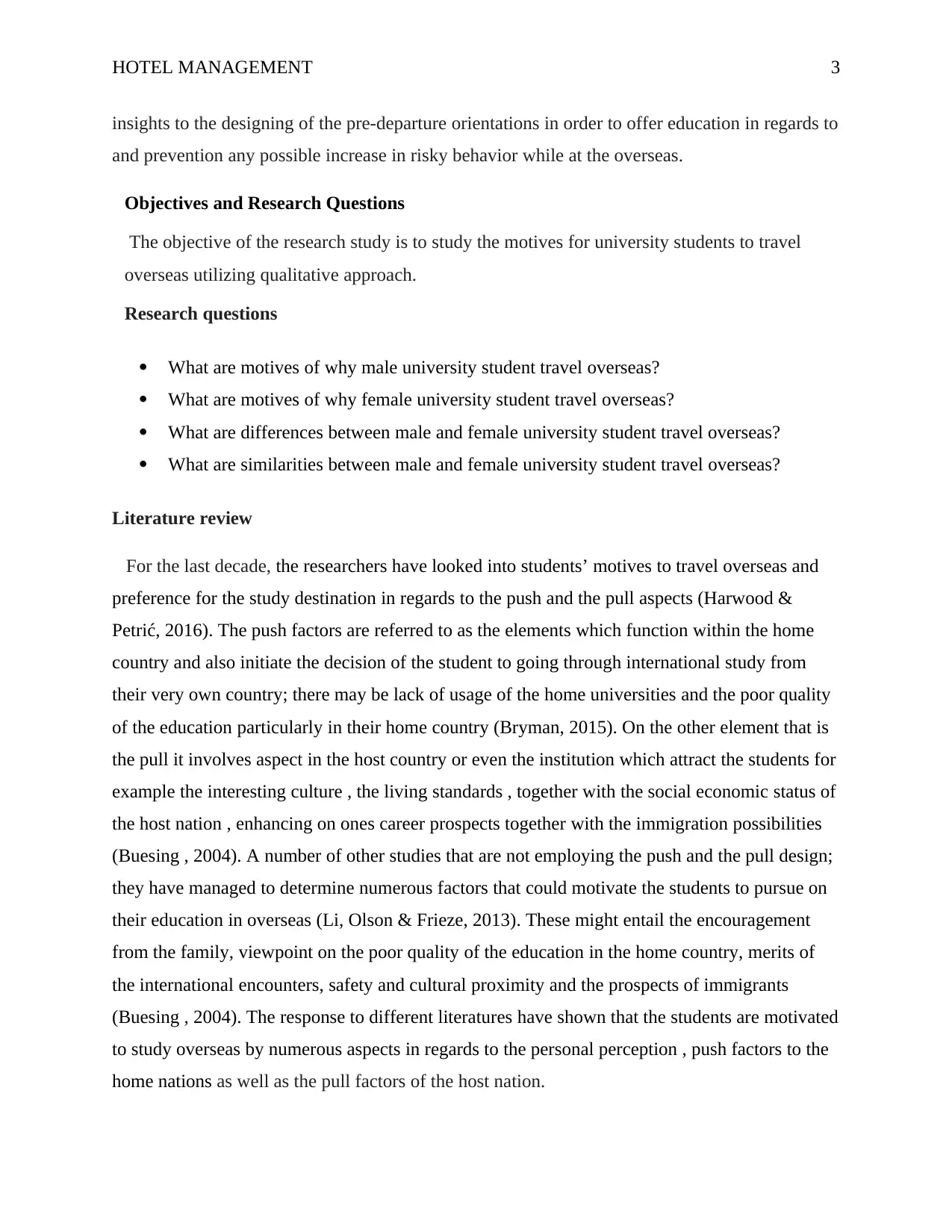
HOTEL MANAGEMENT 3
insights to the designing of the pre-departure orientations in order to offer education in regards to
and prevention any possible increase in risky behavior while at the overseas.
Objectives and Research Questions
The objective of the research study is to study the motives for university students to travel
overseas utilizing qualitative approach.
Research questions
What are motives of why male university student travel overseas?
What are motives of why female university student travel overseas?
What are differences between male and female university student travel overseas?
What are similarities between male and female university student travel overseas?
Literature review
For the last decade, the researchers have looked into students’ motives to travel overseas and
preference for the study destination in regards to the push and the pull aspects (Harwood &
Petrić, 2016). The push factors are referred to as the elements which function within the home
country and also initiate the decision of the student to going through international study from
their very own country; there may be lack of usage of the home universities and the poor quality
of the education particularly in their home country (Bryman, 2015). On the other element that is
the pull it involves aspect in the host country or even the institution which attract the students for
example the interesting culture , the living standards , together with the social economic status of
the host nation , enhancing on ones career prospects together with the immigration possibilities
(Buesing , 2004). A number of other studies that are not employing the push and the pull design;
they have managed to determine numerous factors that could motivate the students to pursue on
their education in overseas (Li, Olson & Frieze, 2013). These might entail the encouragement
from the family, viewpoint on the poor quality of the education in the home country, merits of
the international encounters, safety and cultural proximity and the prospects of immigrants
(Buesing , 2004). The response to different literatures have shown that the students are motivated
to study overseas by numerous aspects in regards to the personal perception , push factors to the
home nations as well as the pull factors of the host nation.
insights to the designing of the pre-departure orientations in order to offer education in regards to
and prevention any possible increase in risky behavior while at the overseas.
Objectives and Research Questions
The objective of the research study is to study the motives for university students to travel
overseas utilizing qualitative approach.
Research questions
What are motives of why male university student travel overseas?
What are motives of why female university student travel overseas?
What are differences between male and female university student travel overseas?
What are similarities between male and female university student travel overseas?
Literature review
For the last decade, the researchers have looked into students’ motives to travel overseas and
preference for the study destination in regards to the push and the pull aspects (Harwood &
Petrić, 2016). The push factors are referred to as the elements which function within the home
country and also initiate the decision of the student to going through international study from
their very own country; there may be lack of usage of the home universities and the poor quality
of the education particularly in their home country (Bryman, 2015). On the other element that is
the pull it involves aspect in the host country or even the institution which attract the students for
example the interesting culture , the living standards , together with the social economic status of
the host nation , enhancing on ones career prospects together with the immigration possibilities
(Buesing , 2004). A number of other studies that are not employing the push and the pull design;
they have managed to determine numerous factors that could motivate the students to pursue on
their education in overseas (Li, Olson & Frieze, 2013). These might entail the encouragement
from the family, viewpoint on the poor quality of the education in the home country, merits of
the international encounters, safety and cultural proximity and the prospects of immigrants
(Buesing , 2004). The response to different literatures have shown that the students are motivated
to study overseas by numerous aspects in regards to the personal perception , push factors to the
home nations as well as the pull factors of the host nation.
⊘ This is a preview!⊘
Do you want full access?
Subscribe today to unlock all pages.

Trusted by 1+ million students worldwide
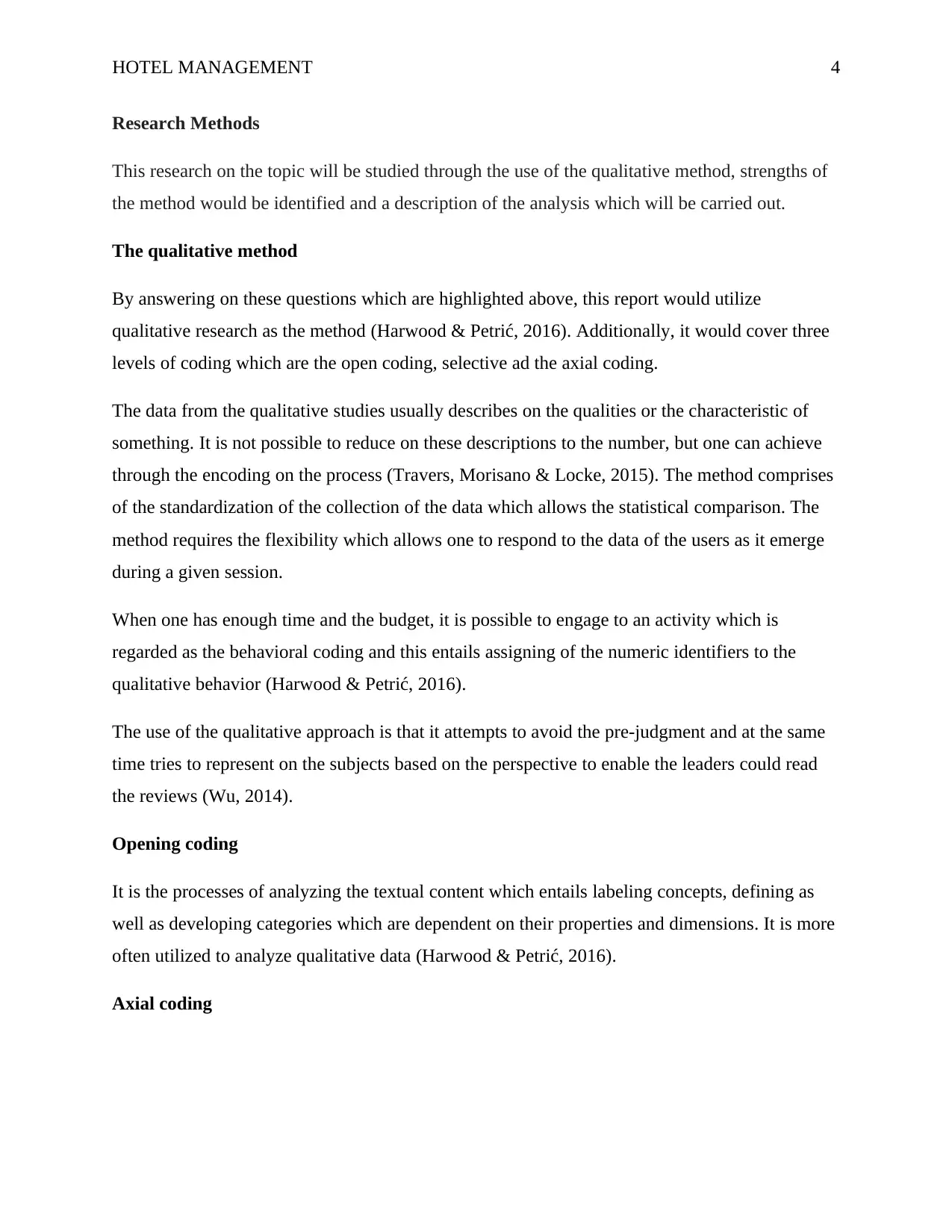
HOTEL MANAGEMENT 4
Research Methods
This research on the topic will be studied through the use of the qualitative method, strengths of
the method would be identified and a description of the analysis which will be carried out.
The qualitative method
By answering on these questions which are highlighted above, this report would utilize
qualitative research as the method (Harwood & Petrić, 2016). Additionally, it would cover three
levels of coding which are the open coding, selective ad the axial coding.
The data from the qualitative studies usually describes on the qualities or the characteristic of
something. It is not possible to reduce on these descriptions to the number, but one can achieve
through the encoding on the process (Travers, Morisano & Locke, 2015). The method comprises
of the standardization of the collection of the data which allows the statistical comparison. The
method requires the flexibility which allows one to respond to the data of the users as it emerge
during a given session.
When one has enough time and the budget, it is possible to engage to an activity which is
regarded as the behavioral coding and this entails assigning of the numeric identifiers to the
qualitative behavior (Harwood & Petrić, 2016).
The use of the qualitative approach is that it attempts to avoid the pre-judgment and at the same
time tries to represent on the subjects based on the perspective to enable the leaders could read
the reviews (Wu, 2014).
Opening coding
It is the processes of analyzing the textual content which entails labeling concepts, defining as
well as developing categories which are dependent on their properties and dimensions. It is more
often utilized to analyze qualitative data (Harwood & Petrić, 2016).
Axial coding
Research Methods
This research on the topic will be studied through the use of the qualitative method, strengths of
the method would be identified and a description of the analysis which will be carried out.
The qualitative method
By answering on these questions which are highlighted above, this report would utilize
qualitative research as the method (Harwood & Petrić, 2016). Additionally, it would cover three
levels of coding which are the open coding, selective ad the axial coding.
The data from the qualitative studies usually describes on the qualities or the characteristic of
something. It is not possible to reduce on these descriptions to the number, but one can achieve
through the encoding on the process (Travers, Morisano & Locke, 2015). The method comprises
of the standardization of the collection of the data which allows the statistical comparison. The
method requires the flexibility which allows one to respond to the data of the users as it emerge
during a given session.
When one has enough time and the budget, it is possible to engage to an activity which is
regarded as the behavioral coding and this entails assigning of the numeric identifiers to the
qualitative behavior (Harwood & Petrić, 2016).
The use of the qualitative approach is that it attempts to avoid the pre-judgment and at the same
time tries to represent on the subjects based on the perspective to enable the leaders could read
the reviews (Wu, 2014).
Opening coding
It is the processes of analyzing the textual content which entails labeling concepts, defining as
well as developing categories which are dependent on their properties and dimensions. It is more
often utilized to analyze qualitative data (Harwood & Petrić, 2016).
Axial coding
Paraphrase This Document
Need a fresh take? Get an instant paraphrase of this document with our AI Paraphraser
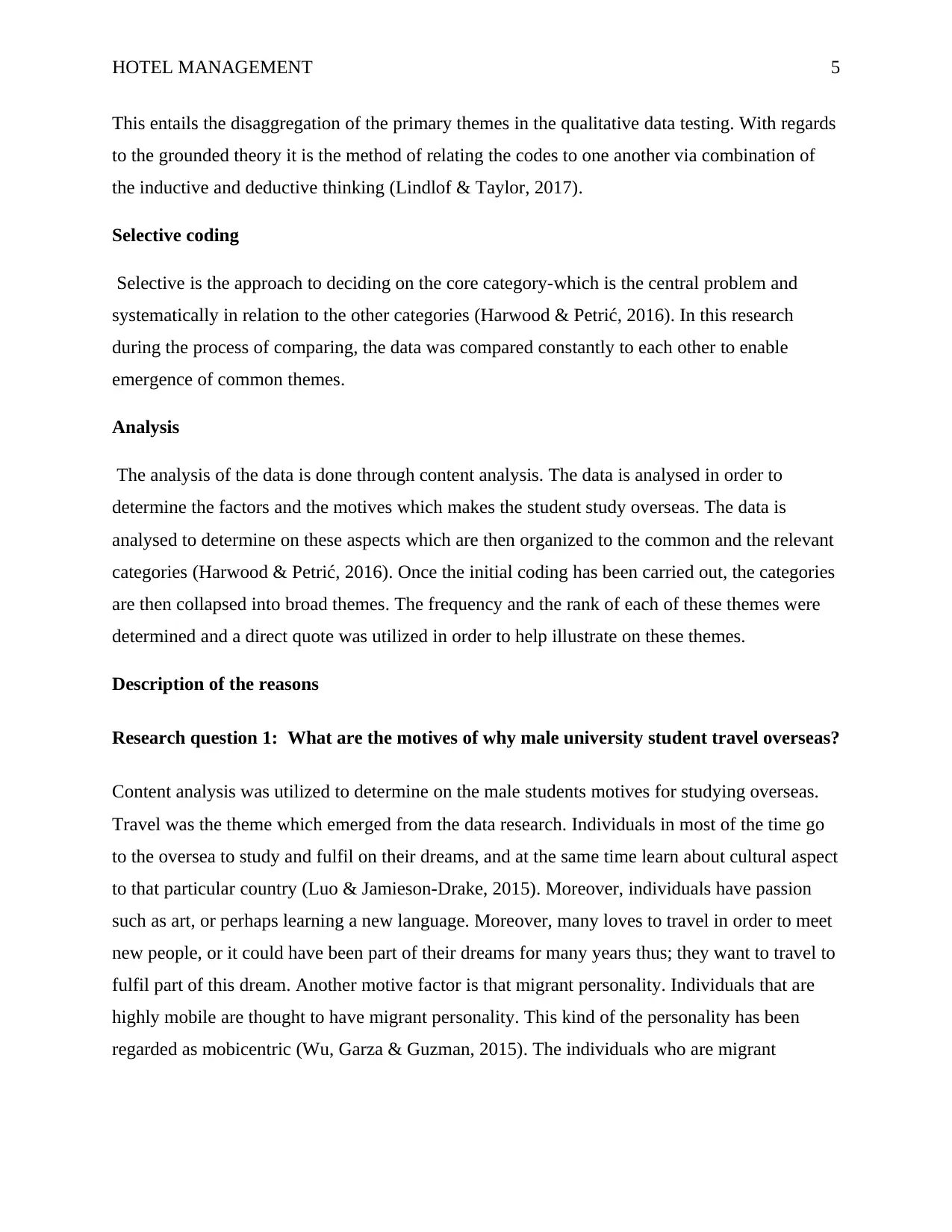
HOTEL MANAGEMENT 5
This entails the disaggregation of the primary themes in the qualitative data testing. With regards
to the grounded theory it is the method of relating the codes to one another via combination of
the inductive and deductive thinking (Lindlof & Taylor, 2017).
Selective coding
Selective is the approach to deciding on the core category-which is the central problem and
systematically in relation to the other categories (Harwood & Petrić, 2016). In this research
during the process of comparing, the data was compared constantly to each other to enable
emergence of common themes.
Analysis
The analysis of the data is done through content analysis. The data is analysed in order to
determine the factors and the motives which makes the student study overseas. The data is
analysed to determine on these aspects which are then organized to the common and the relevant
categories (Harwood & Petrić, 2016). Once the initial coding has been carried out, the categories
are then collapsed into broad themes. The frequency and the rank of each of these themes were
determined and a direct quote was utilized in order to help illustrate on these themes.
Description of the reasons
Research question 1: What are the motives of why male university student travel overseas?
Content analysis was utilized to determine on the male students motives for studying overseas.
Travel was the theme which emerged from the data research. Individuals in most of the time go
to the oversea to study and fulfil on their dreams, and at the same time learn about cultural aspect
to that particular country (Luo & Jamieson-Drake, 2015). Moreover, individuals have passion
such as art, or perhaps learning a new language. Moreover, many loves to travel in order to meet
new people, or it could have been part of their dreams for many years thus; they want to travel to
fulfil part of this dream. Another motive factor is that migrant personality. Individuals that are
highly mobile are thought to have migrant personality. This kind of the personality has been
regarded as mobicentric (Wu, Garza & Guzman, 2015). The individuals who are migrant
This entails the disaggregation of the primary themes in the qualitative data testing. With regards
to the grounded theory it is the method of relating the codes to one another via combination of
the inductive and deductive thinking (Lindlof & Taylor, 2017).
Selective coding
Selective is the approach to deciding on the core category-which is the central problem and
systematically in relation to the other categories (Harwood & Petrić, 2016). In this research
during the process of comparing, the data was compared constantly to each other to enable
emergence of common themes.
Analysis
The analysis of the data is done through content analysis. The data is analysed in order to
determine the factors and the motives which makes the student study overseas. The data is
analysed to determine on these aspects which are then organized to the common and the relevant
categories (Harwood & Petrić, 2016). Once the initial coding has been carried out, the categories
are then collapsed into broad themes. The frequency and the rank of each of these themes were
determined and a direct quote was utilized in order to help illustrate on these themes.
Description of the reasons
Research question 1: What are the motives of why male university student travel overseas?
Content analysis was utilized to determine on the male students motives for studying overseas.
Travel was the theme which emerged from the data research. Individuals in most of the time go
to the oversea to study and fulfil on their dreams, and at the same time learn about cultural aspect
to that particular country (Luo & Jamieson-Drake, 2015). Moreover, individuals have passion
such as art, or perhaps learning a new language. Moreover, many loves to travel in order to meet
new people, or it could have been part of their dreams for many years thus; they want to travel to
fulfil part of this dream. Another motive factor is that migrant personality. Individuals that are
highly mobile are thought to have migrant personality. This kind of the personality has been
regarded as mobicentric (Wu, Garza & Guzman, 2015). The individuals who are migrant
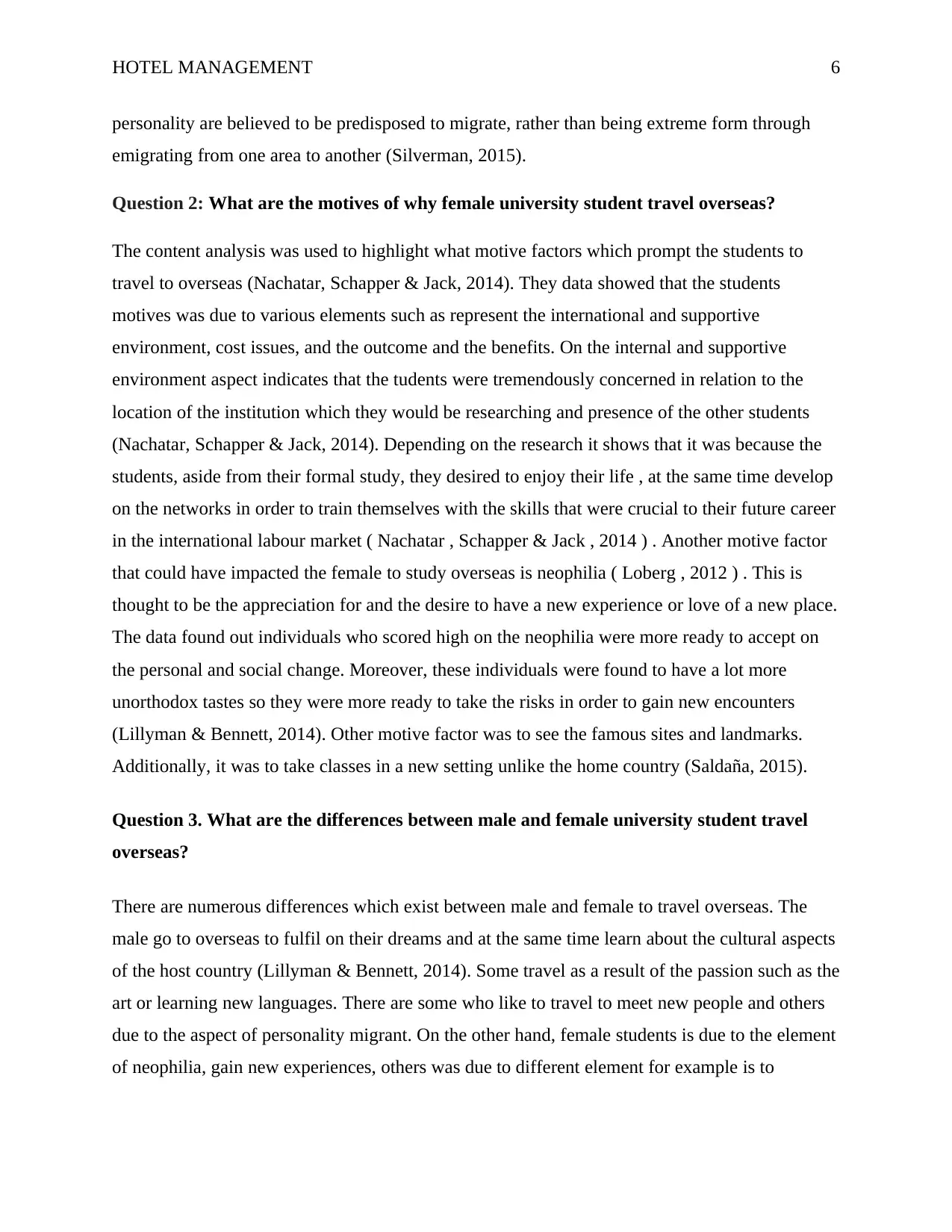
HOTEL MANAGEMENT 6
personality are believed to be predisposed to migrate, rather than being extreme form through
emigrating from one area to another (Silverman, 2015).
Question 2: What are the motives of why female university student travel overseas?
The content analysis was used to highlight what motive factors which prompt the students to
travel to overseas (Nachatar, Schapper & Jack, 2014). They data showed that the students
motives was due to various elements such as represent the international and supportive
environment, cost issues, and the outcome and the benefits. On the internal and supportive
environment aspect indicates that the tudents were tremendously concerned in relation to the
location of the institution which they would be researching and presence of the other students
(Nachatar, Schapper & Jack, 2014). Depending on the research it shows that it was because the
students, aside from their formal study, they desired to enjoy their life , at the same time develop
on the networks in order to train themselves with the skills that were crucial to their future career
in the international labour market ( Nachatar , Schapper & Jack , 2014 ) . Another motive factor
that could have impacted the female to study overseas is neophilia ( Loberg , 2012 ) . This is
thought to be the appreciation for and the desire to have a new experience or love of a new place.
The data found out individuals who scored high on the neophilia were more ready to accept on
the personal and social change. Moreover, these individuals were found to have a lot more
unorthodox tastes so they were more ready to take the risks in order to gain new encounters
(Lillyman & Bennett, 2014). Other motive factor was to see the famous sites and landmarks.
Additionally, it was to take classes in a new setting unlike the home country (Saldaña, 2015).
Question 3. What are the differences between male and female university student travel
overseas?
There are numerous differences which exist between male and female to travel overseas. The
male go to overseas to fulfil on their dreams and at the same time learn about the cultural aspects
of the host country (Lillyman & Bennett, 2014). Some travel as a result of the passion such as the
art or learning new languages. There are some who like to travel to meet new people and others
due to the aspect of personality migrant. On the other hand, female students is due to the element
of neophilia, gain new experiences, others was due to different element for example is to
personality are believed to be predisposed to migrate, rather than being extreme form through
emigrating from one area to another (Silverman, 2015).
Question 2: What are the motives of why female university student travel overseas?
The content analysis was used to highlight what motive factors which prompt the students to
travel to overseas (Nachatar, Schapper & Jack, 2014). They data showed that the students
motives was due to various elements such as represent the international and supportive
environment, cost issues, and the outcome and the benefits. On the internal and supportive
environment aspect indicates that the tudents were tremendously concerned in relation to the
location of the institution which they would be researching and presence of the other students
(Nachatar, Schapper & Jack, 2014). Depending on the research it shows that it was because the
students, aside from their formal study, they desired to enjoy their life , at the same time develop
on the networks in order to train themselves with the skills that were crucial to their future career
in the international labour market ( Nachatar , Schapper & Jack , 2014 ) . Another motive factor
that could have impacted the female to study overseas is neophilia ( Loberg , 2012 ) . This is
thought to be the appreciation for and the desire to have a new experience or love of a new place.
The data found out individuals who scored high on the neophilia were more ready to accept on
the personal and social change. Moreover, these individuals were found to have a lot more
unorthodox tastes so they were more ready to take the risks in order to gain new encounters
(Lillyman & Bennett, 2014). Other motive factor was to see the famous sites and landmarks.
Additionally, it was to take classes in a new setting unlike the home country (Saldaña, 2015).
Question 3. What are the differences between male and female university student travel
overseas?
There are numerous differences which exist between male and female to travel overseas. The
male go to overseas to fulfil on their dreams and at the same time learn about the cultural aspects
of the host country (Lillyman & Bennett, 2014). Some travel as a result of the passion such as the
art or learning new languages. There are some who like to travel to meet new people and others
due to the aspect of personality migrant. On the other hand, female students is due to the element
of neophilia, gain new experiences, others was due to different element for example is to
⊘ This is a preview!⊘
Do you want full access?
Subscribe today to unlock all pages.

Trusted by 1+ million students worldwide
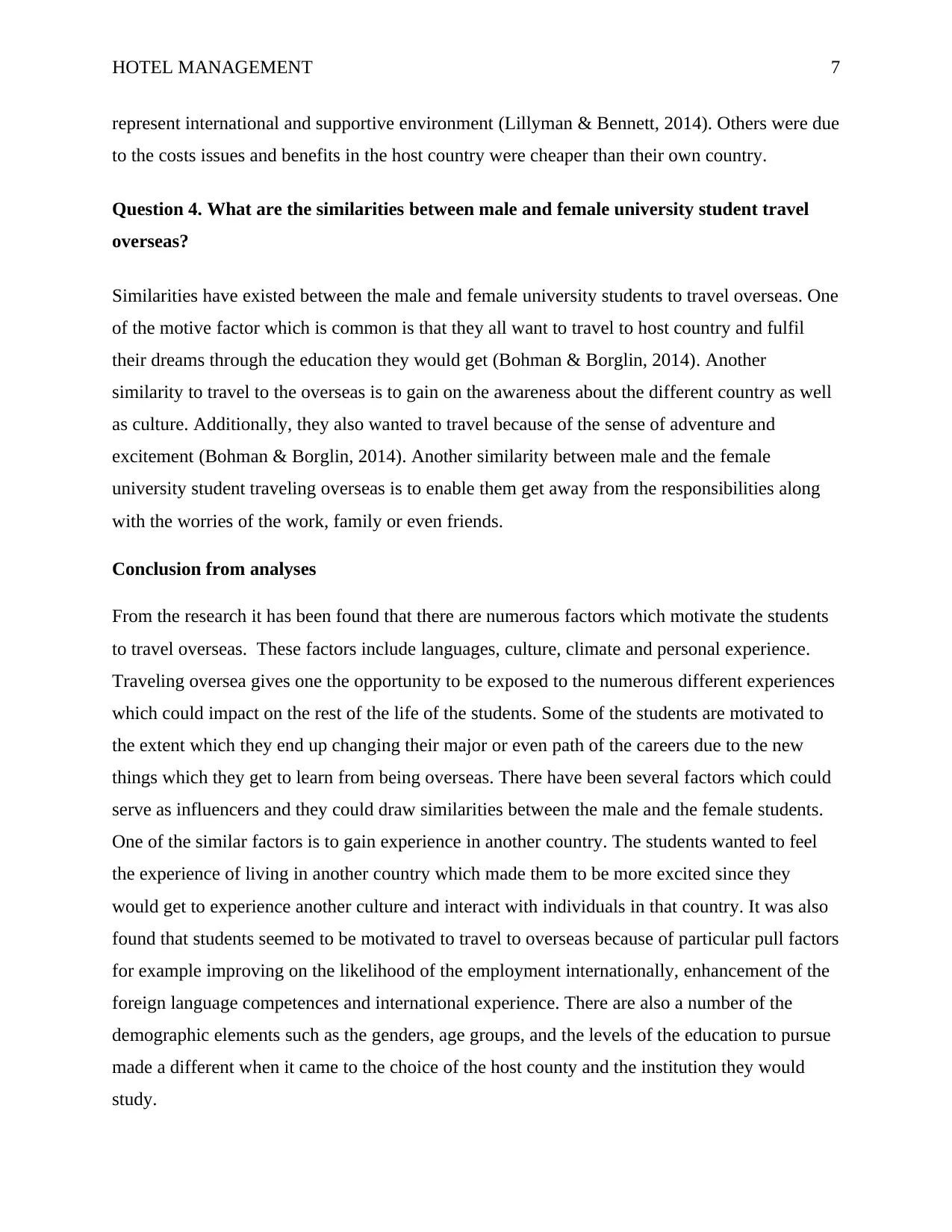
HOTEL MANAGEMENT 7
represent international and supportive environment (Lillyman & Bennett, 2014). Others were due
to the costs issues and benefits in the host country were cheaper than their own country.
Question 4. What are the similarities between male and female university student travel
overseas?
Similarities have existed between the male and female university students to travel overseas. One
of the motive factor which is common is that they all want to travel to host country and fulfil
their dreams through the education they would get (Bohman & Borglin, 2014). Another
similarity to travel to the overseas is to gain on the awareness about the different country as well
as culture. Additionally, they also wanted to travel because of the sense of adventure and
excitement (Bohman & Borglin, 2014). Another similarity between male and the female
university student traveling overseas is to enable them get away from the responsibilities along
with the worries of the work, family or even friends.
Conclusion from analyses
From the research it has been found that there are numerous factors which motivate the students
to travel overseas. These factors include languages, culture, climate and personal experience.
Traveling oversea gives one the opportunity to be exposed to the numerous different experiences
which could impact on the rest of the life of the students. Some of the students are motivated to
the extent which they end up changing their major or even path of the careers due to the new
things which they get to learn from being overseas. There have been several factors which could
serve as influencers and they could draw similarities between the male and the female students.
One of the similar factors is to gain experience in another country. The students wanted to feel
the experience of living in another country which made them to be more excited since they
would get to experience another culture and interact with individuals in that country. It was also
found that students seemed to be motivated to travel to overseas because of particular pull factors
for example improving on the likelihood of the employment internationally, enhancement of the
foreign language competences and international experience. There are also a number of the
demographic elements such as the genders, age groups, and the levels of the education to pursue
made a different when it came to the choice of the host county and the institution they would
study.
represent international and supportive environment (Lillyman & Bennett, 2014). Others were due
to the costs issues and benefits in the host country were cheaper than their own country.
Question 4. What are the similarities between male and female university student travel
overseas?
Similarities have existed between the male and female university students to travel overseas. One
of the motive factor which is common is that they all want to travel to host country and fulfil
their dreams through the education they would get (Bohman & Borglin, 2014). Another
similarity to travel to the overseas is to gain on the awareness about the different country as well
as culture. Additionally, they also wanted to travel because of the sense of adventure and
excitement (Bohman & Borglin, 2014). Another similarity between male and the female
university student traveling overseas is to enable them get away from the responsibilities along
with the worries of the work, family or even friends.
Conclusion from analyses
From the research it has been found that there are numerous factors which motivate the students
to travel overseas. These factors include languages, culture, climate and personal experience.
Traveling oversea gives one the opportunity to be exposed to the numerous different experiences
which could impact on the rest of the life of the students. Some of the students are motivated to
the extent which they end up changing their major or even path of the careers due to the new
things which they get to learn from being overseas. There have been several factors which could
serve as influencers and they could draw similarities between the male and the female students.
One of the similar factors is to gain experience in another country. The students wanted to feel
the experience of living in another country which made them to be more excited since they
would get to experience another culture and interact with individuals in that country. It was also
found that students seemed to be motivated to travel to overseas because of particular pull factors
for example improving on the likelihood of the employment internationally, enhancement of the
foreign language competences and international experience. There are also a number of the
demographic elements such as the genders, age groups, and the levels of the education to pursue
made a different when it came to the choice of the host county and the institution they would
study.
Paraphrase This Document
Need a fresh take? Get an instant paraphrase of this document with our AI Paraphraser

HOTEL MANAGEMENT 8
With these finding, it is recommended that the university students who are traveling overseas to
take into account to these kind of the demographic factors to offer them a relevant information
which would assist them to make decisions that are more informed. This not only helps them to
choose the institution which are suited on their needs, but would also help them select the host
country for travel which would provide them with the best experience.
With these finding, it is recommended that the university students who are traveling overseas to
take into account to these kind of the demographic factors to offer them a relevant information
which would assist them to make decisions that are more informed. This not only helps them to
choose the institution which are suited on their needs, but would also help them select the host
country for travel which would provide them with the best experience.
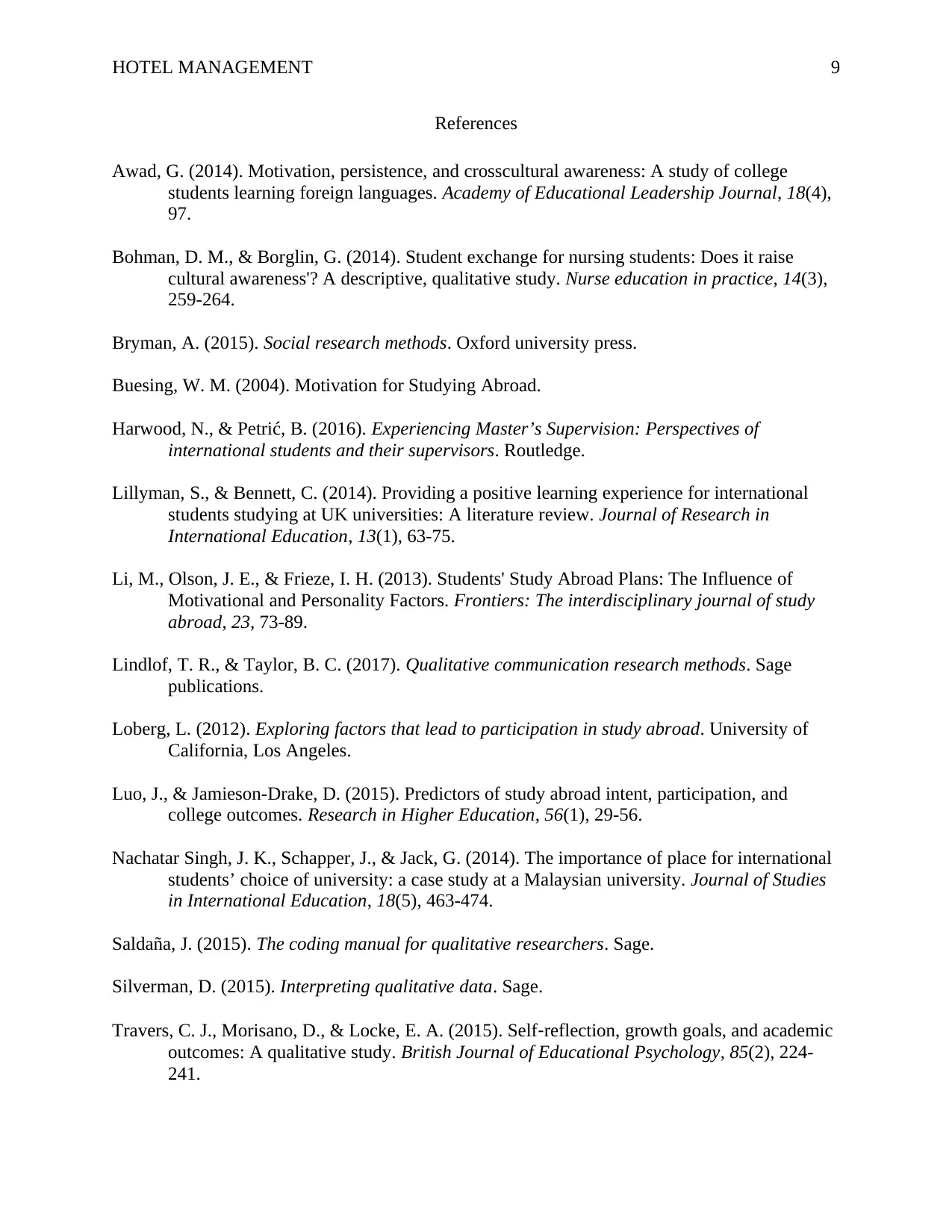
HOTEL MANAGEMENT 9
References
Awad, G. (2014). Motivation, persistence, and crosscultural awareness: A study of college
students learning foreign languages. Academy of Educational Leadership Journal, 18(4),
97.
Bohman, D. M., & Borglin, G. (2014). Student exchange for nursing students: Does it raise
cultural awareness'? A descriptive, qualitative study. Nurse education in practice, 14(3),
259-264.
Bryman, A. (2015). Social research methods. Oxford university press.
Buesing, W. M. (2004). Motivation for Studying Abroad.
Harwood, N., & Petrić, B. (2016). Experiencing Master’s Supervision: Perspectives of
international students and their supervisors. Routledge.
Lillyman, S., & Bennett, C. (2014). Providing a positive learning experience for international
students studying at UK universities: A literature review. Journal of Research in
International Education, 13(1), 63-75.
Li, M., Olson, J. E., & Frieze, I. H. (2013). Students' Study Abroad Plans: The Influence of
Motivational and Personality Factors. Frontiers: The interdisciplinary journal of study
abroad, 23, 73-89.
Lindlof, T. R., & Taylor, B. C. (2017). Qualitative communication research methods. Sage
publications.
Loberg, L. (2012). Exploring factors that lead to participation in study abroad. University of
California, Los Angeles.
Luo, J., & Jamieson-Drake, D. (2015). Predictors of study abroad intent, participation, and
college outcomes. Research in Higher Education, 56(1), 29-56.
Nachatar Singh, J. K., Schapper, J., & Jack, G. (2014). The importance of place for international
students’ choice of university: a case study at a Malaysian university. Journal of Studies
in International Education, 18(5), 463-474.
Saldaña, J. (2015). The coding manual for qualitative researchers. Sage.
Silverman, D. (2015). Interpreting qualitative data. Sage.
Travers, C. J., Morisano, D., & Locke, E. A. (2015). Self‐reflection, growth goals, and academic
outcomes: A qualitative study. British Journal of Educational Psychology, 85(2), 224-
241.
References
Awad, G. (2014). Motivation, persistence, and crosscultural awareness: A study of college
students learning foreign languages. Academy of Educational Leadership Journal, 18(4),
97.
Bohman, D. M., & Borglin, G. (2014). Student exchange for nursing students: Does it raise
cultural awareness'? A descriptive, qualitative study. Nurse education in practice, 14(3),
259-264.
Bryman, A. (2015). Social research methods. Oxford university press.
Buesing, W. M. (2004). Motivation for Studying Abroad.
Harwood, N., & Petrić, B. (2016). Experiencing Master’s Supervision: Perspectives of
international students and their supervisors. Routledge.
Lillyman, S., & Bennett, C. (2014). Providing a positive learning experience for international
students studying at UK universities: A literature review. Journal of Research in
International Education, 13(1), 63-75.
Li, M., Olson, J. E., & Frieze, I. H. (2013). Students' Study Abroad Plans: The Influence of
Motivational and Personality Factors. Frontiers: The interdisciplinary journal of study
abroad, 23, 73-89.
Lindlof, T. R., & Taylor, B. C. (2017). Qualitative communication research methods. Sage
publications.
Loberg, L. (2012). Exploring factors that lead to participation in study abroad. University of
California, Los Angeles.
Luo, J., & Jamieson-Drake, D. (2015). Predictors of study abroad intent, participation, and
college outcomes. Research in Higher Education, 56(1), 29-56.
Nachatar Singh, J. K., Schapper, J., & Jack, G. (2014). The importance of place for international
students’ choice of university: a case study at a Malaysian university. Journal of Studies
in International Education, 18(5), 463-474.
Saldaña, J. (2015). The coding manual for qualitative researchers. Sage.
Silverman, D. (2015). Interpreting qualitative data. Sage.
Travers, C. J., Morisano, D., & Locke, E. A. (2015). Self‐reflection, growth goals, and academic
outcomes: A qualitative study. British Journal of Educational Psychology, 85(2), 224-
241.
⊘ This is a preview!⊘
Do you want full access?
Subscribe today to unlock all pages.

Trusted by 1+ million students worldwide
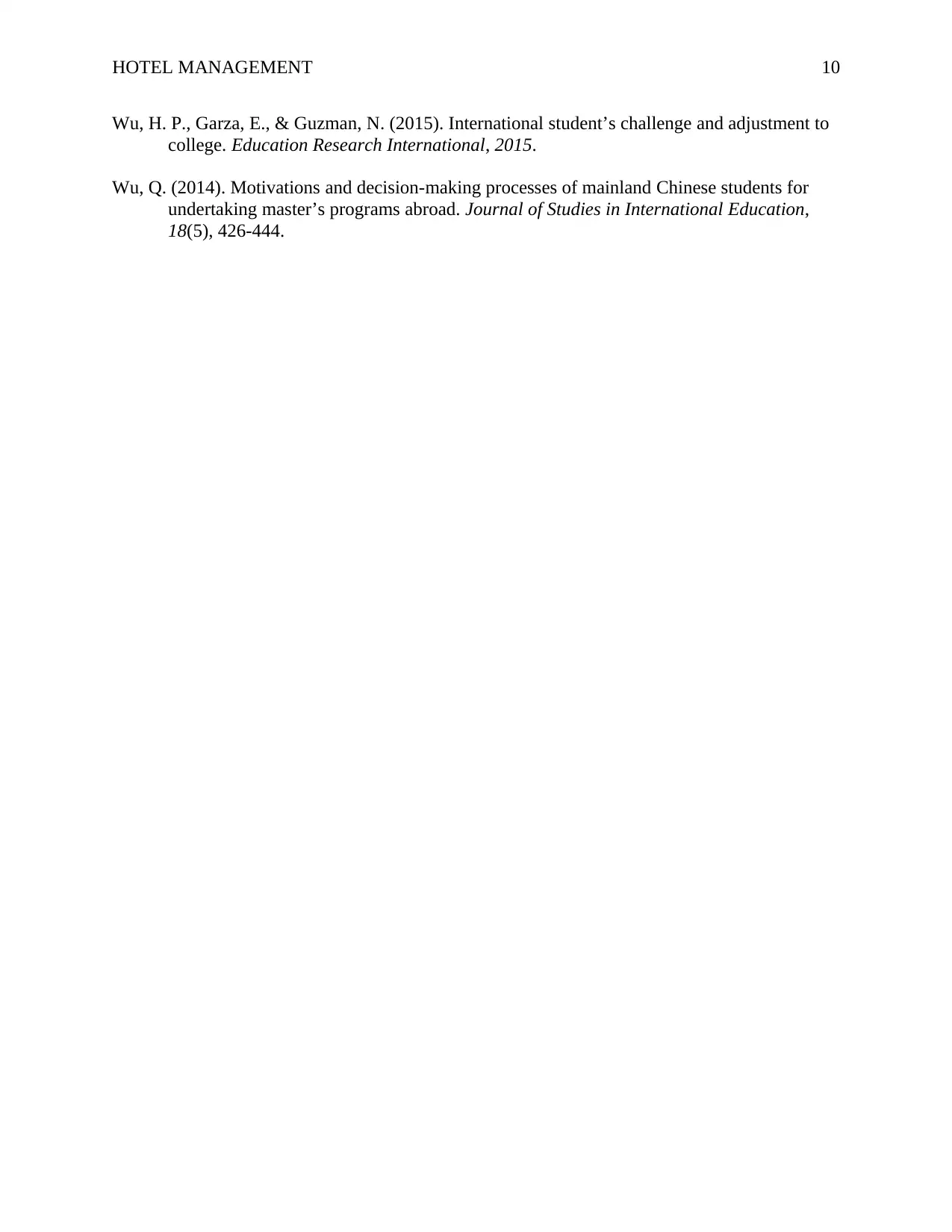
HOTEL MANAGEMENT 10
Wu, H. P., Garza, E., & Guzman, N. (2015). International student’s challenge and adjustment to
college. Education Research International, 2015.
Wu, Q. (2014). Motivations and decision-making processes of mainland Chinese students for
undertaking master’s programs abroad. Journal of Studies in International Education,
18(5), 426-444.
Wu, H. P., Garza, E., & Guzman, N. (2015). International student’s challenge and adjustment to
college. Education Research International, 2015.
Wu, Q. (2014). Motivations and decision-making processes of mainland Chinese students for
undertaking master’s programs abroad. Journal of Studies in International Education,
18(5), 426-444.
1 out of 10
Related Documents
Your All-in-One AI-Powered Toolkit for Academic Success.
+13062052269
info@desklib.com
Available 24*7 on WhatsApp / Email
![[object Object]](/_next/static/media/star-bottom.7253800d.svg)
Unlock your academic potential
Copyright © 2020–2026 A2Z Services. All Rights Reserved. Developed and managed by ZUCOL.




